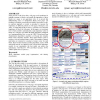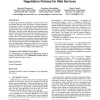136
click to vote
WWW
2004
ACM
16 years 3 months ago
2004
ACM
Web link analysis has proven to be a significant enhancement for quality based web search. Most existing links can be classified into two categories: intra-type links (e.g., web h...
156
Voted
WWW
2004
ACM
16 years 3 months ago
2004
ACM
The overwhelming success of the Web as a mechanism for facilitating information retrieval and for conducting business transactions has led to an increase in the deployment of comp...
143
click to vote
WWW
2004
ACM
16 years 3 months ago
2004
ACM
We address the problem of integrating objects from a source taxonomy into a master taxonomy. This problem is not only currently pervasive on the web, but also important to the eme...
114
Voted
WWW
2004
ACM
16 years 3 months ago
2004
ACM
Web search engines help users find useful information on the World Wide Web (WWW). However, when the same query is submitted by different users, typical search engines return the ...
114
click to vote
WWW
2004
ACM
16 years 3 months ago
2004
ACM
A technical infrastructure for storing, querying and managing RDF data is a key element in the current semantic web development. Systems like Jena, Sesame or the ICS-FORTH RDF Sui...
110
Voted
WWW
2004
ACM
16 years 3 months ago
2004
ACM
Automatically generated HTML, as produced by WYSIWYG programs, typically contains much repetitive and unnecessary markup. This paper identifies aspects of such HTML that may be al...
128
Voted
WWW
2004
ACM
16 years 3 months ago
2004
ACM
Some previous works show that a web page can be partitioned to multiple segments or blocks, and usually the importance of those blocks in a page is not equivalent. Also, it is pro...
108
Voted
WWW
2004
ACM
16 years 3 months ago
2004
ACM
A scalable approach to trust negotiation is required in Web service environments that have large and dynamic requester populations. We introduce Trust-Serv, a model-driven trust n...
111
Voted
WWW
2004
ACM
16 years 3 months ago
2004
ACM
In peer-to-peer networks, finding the appropriate answer for an information request, such as the answer to a query for RDF(S) data, depends on selecting the right peer in the netw...
127
click to vote
WWW
2004
ACM
16 years 3 months ago
2004
ACM
We propose new features and algorithms for automating Web-page classification tasks such as content recommendation and ad blocking. We show that the automated classification of We...


